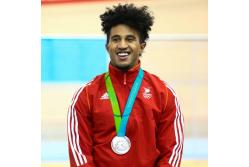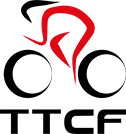The Medal Factors - Njisane Phillip
Gary AcostaSunday, August 7 2016
It has been an arduous four year journey from the completion of the London 2012 drive on August 7th that year at the London Olympic Velodrome to now August 12th, 2016 at the brand new Rio Olympic Velodrome for the XXXI Olympiad. Njisane has endured the hardship of overcoming a serious life threatening illness, depression and a drastic change to the Olympic qualification process which introduced a qualification for the World Cup events.
Regardless of the tribulations faced, the Siparia boy has battled through thick and thin to once again earn T&T a spot at the world’s biggest stage, the Olympic Games. Here’s an in depth synopsis of the factors that can affect the outcome of Njisane’s medal aspirations:
COACH FACTOR
2010 saw some of Njisane Phillip’s best performances with a Gold and Bronze at the CAC Games followed by an unprecedented 5th in the Men’s Sprint at the tender age of 19. In his corner at that time was former National High Performance Director and a 2x Olympic Medalist, Erin Hartwell. As of February 2016, Njisane was given the opportunity to train with the Canadian National Team leading up to Rio and may you guess who their National Coach is? 
The man partly responsible for Njisane’s success early in his career is once again guiding a familiar face. There are some critiques who believe that six months may not be enough time for Hartwell to make a meaningful impact. I beg to differ, as Hartwell’s results, especially those with little time to prepare, have spoken for themselves.
Since being appointed as the Track Sprint Coach of Cycling Canada in July 2014, he has absolutely turned their sprint program around. From being provided with a Women’s Team Sprint that had not even ridden together before September 2014 and a cyclist returning from retirement, he developed and secured an Olympic berth through the rigours of a two-year Olympic qualification process.
Fast forward to July 2015 where he guided Team Canada to seven (7) Sprint medals, five (5) of which were Gold! Fast forward even further to October 2015 when his top male sprint cyclist, Hugo Barette was involved in near death crash while training for the World Cup in Cali, Colombia. Some wondered if Barette would even walk again, much less be back on a bike before Rio. Hartwell was still able to have Barette snatch a Silver two months later at the Hong Kong World Cup and later then secured Olympic berth in the Keirin event.
There is no doubt that Coach Factor will play an important role in Phillip’s success.
TIMES FACTOR
The evolution of Sprint cycling went through a rapid phase change after London 2012 as the Flying 200m qualification times drastically got faster. Before 2012, it was rare to clock a cyclist dipping below 10.0 seconds at sea level, now, qualification may even not be guaranteed without a sub-10 time depending on the velodrome.

Within the last World Cup campaign, Phillip travelled to Colombia, New Zealand, Hong Kong and London within four months during his Olympic qualification bid and it does not take the skills of a mathematician to determine that Njisane got faster with each event he participated in. Starting with a dismal 10.102 in Cali, Colombia he returned to clock two sub-tens, first in Hong Kong with 9.990 and then in London at the World Championships with 9.969 seconds for his 9th and 10th times respectively under 10 seconds in his career.
At the Rio Olympic Velodrome, I suspect that with his meticulous preparation, a qualification time of 9.7 or 9.8 is achievable by the Sonics sprinter which would put him with a great position to medal in the Sprints.
UNDERDOG FACTOR
There is no doubting that in any sporting event there will be favourites and there will be the dark horse that no one predicted would be a force to be reckoned with. Several worldwide media houses have placed the odds in the favour of Jason Kenny (GBR), Matthew Glaetzer (AUS) and Jeffrey Hoogland (NED) to medal in the coveted sprint event. Their performances over the past few months justify the bookkeepers’ predictions.  No mathematical formula or statistical analysis however could calculate the will of the human being. It is without a doubt that Phillip’s best performances have always been when he has not been heavily favoured; case in point, London 2012.
No mathematical formula or statistical analysis however could calculate the will of the human being. It is without a doubt that Phillip’s best performances have always been when he has not been heavily favoured; case in point, London 2012.
Since then, several countries have studied his tactics and have trained to counteract them. In a recent interview however, Njisane indicated that he has been working on changing his tactics, making him more unpredictable and difficult to defeat.
CLIMATE FACTOR
Finally, born and raised in the Tropics gives Njisane an added advantage with respect to adapting to the climate in Rio de Janeiro. The top track sprinters in the world hail from mostly European or Oceanic countries. The respective High Performance Directors and Sports Scientists from these countries have been forced to heat stress their cyclists in an attempt get them to adapt to the heat and humidity in Brasil.
These tactics include changing their home bases to outdoor cycle tracks in countries with close to tropical climates and/or cranking the temperature inside climate controlled velodromes to as hot as 35 degrees Celsius during training sessions. The only Trini in the field did not need that acclimatization and thus walks into the velodrome with one less worry than most of those placing their bikes on the line.
Regardless of Njisane’s performance this coming weekend, there is no doubt that he will place his best effort on the track. After a tumultuous qualification campaign, he has been able to settle down with a coach that he has placed his full trust in and has entered the Olympic Village in the best form of his life.
We wait with bated breath to celebrate his success!

